Welcome back to This Week in Apps, the Extra Crunch series that recaps the latest OS news, the applications they support and the money that flows through it all.
The app industry is as hot as ever, with a record 204 billion downloads and $120 billion in consumer spending in 2019. People are now spending 3 hours and 40 minutes per day using apps, rivaling TV. Apps aren’t just a way to pass idle hours — they’re a big business. In 2019, mobile-first companies had a combined $544 billion valuation, 6.5x higher than those without a mobile focus.
In this Extra Crunch series, we help you keep up with the latest news from the world of apps, delivered on a weekly basis.
This week we’re continuing to look at how the coronavirus outbreak is impacting the world of mobile applications, including the latest on countries’ various contact-tracing apps, the pandemic’s impact on gaming and fintech and more. We’re also looking at that big app crash caused by Facebook, plus new app releases from Facebook and Google, Android 11’s new timeline and Apple’s plans to move WWDC online, among other things.
Headlines
WWDC goes virtual June 22

Apple announced this week its plans for a virtual version of its Worldwide Developer Conference. The company will host its WWDC 2020 event beginning on June 22 in the Apple Developer app and on the Apple Developer website for free for all developers.
It will be interesting to see how successfully Apple is able to take its developer conference online. After all, developers could already access the sessions and keynotes through videos — but the real power of the event was in the networking and being able to talk to Apple engineers, ask questions, get hands-on help and see how other developers are using Apple technologies to innovate. Unless Apple is planning a big revamp of its developer site and app that would enable those connections, it seems this year’s event will lack some of WWDC’s magic.
The company also announced the Swift Student Challenge, an opportunity for student developers to showcase their coding by creating their own Swift playground.
Facebook bug crashes a number of top iOS apps

A software bug in Facebook’s SDK, which is integrated with a significant number of mobile applications, led to issues on Wednesday with several of the biggest iOS apps. Top apps — including TikTok, Spotify, Venmo, DoorDash, Pinterest, Tinder, Bumble, Soundcloud, Waze and many others — were suddenly crashing due to the bug. Facebook quickly identified and fixed the problem after confirming it was at fault.
The issue was a clear demonstration of how wide Facebook’s reach has become, as many iOS device owners found all their most-used apps had become briefly inoperable. App developer Guilherme Rambo, on his website, described the issue as “third-party SDK creep” and said it was like Facebook had an “app kill switch.”
It’s also an example of how much data Facebook extracts from the app ecosystem, he noted.
“It’s quite possible that every single app you use on any particular day is running code from Facebook, Google and other data-gathering and data-mining companies,” Rambo wrote. “Because of the way this code is integrated — by linking to a dynamic library at build time — it means these companies can effectively control those apps, or worse, access all of the data those apps have access to.”
The issue with the Facebook SDK was especially bad because the crashes would have impacted any app that included the SDK, even if the app wasn’t currently using it.
Rambo suggested one solution would be to implement a form of sandboxing that would prevent SDKs from grabbing user data unless the user explicitly allowed it to do so after answering a permissions dialog box. This would require a technical change to how apps work on Apple’s side — so there’s nothing developers can do today except not include the Facebook SDK (or others) to begin with.
Google delays Android 11
Citing scheduling challenges caused by the coronavirus pandemic, Google said this week it’s extending the preview period by a month. That means, instead of launching a beta this month as was planned, it released a fourth developer preview.
The first beta will now come on June 3, during Google’s online event that’s being held instead of its annual I/O developer conference.
Google told developers to target the Beta 1 release date of June 3. This group of beta testers will be large because Google will make over-the-air updates available to users who opt in to the beta and have a compatible device.
COVID-19 tracing apps
- INDIA: There were continued concerns over India’s contact-tracing app, as security researcher Baptiste Robert published a blog post that warned how hackers could use a triangulation attack to confirm who is and is not sick. “The developers of this app didn’t think that someone malicious would be able to intercept its requests and modify them to get information on a specific area,” he wrote. “They honestly didn’t consider this use of the app.”
- U.K.: The U.K. may be rethinking its decision to shun Apple and Google’s contact-tracing tech, according to The FT. Its app, NHS COVID-19, has been criticized for its use of a centralized app architecture. It also lacks robust legal safeguards against data misuse, a U.K. parliamentary committee that focuses on human rights issues said.
- France: Meanwhile, France is moving forward with its own contact-tracing tech, which uses a centralized approach, instead of adopting Google and Apple’s protocol. The app will begin testing May 11.
- U.S.: Apple and Google’s efforts move forward as they release sample code, UI and detailed policies for COVID-19 exposure-notification apps.
Square and its Cash App see boost from pandemic
Square said in March its Cash App added the largest number of new transacting customers due to what it described as “significant shifts in consumer behavior” and its work connecting consumers with their stimulus payments. The company said customer use of P2P payments has changed in recent days as customers took actions like donating to online fundraisers and religious organizations, tipping using the app and reimbursing one another for supplies.
It also worked with partner banks to expand direct deposit eligibility from three million customers in February to 14 million ahead of April 15.
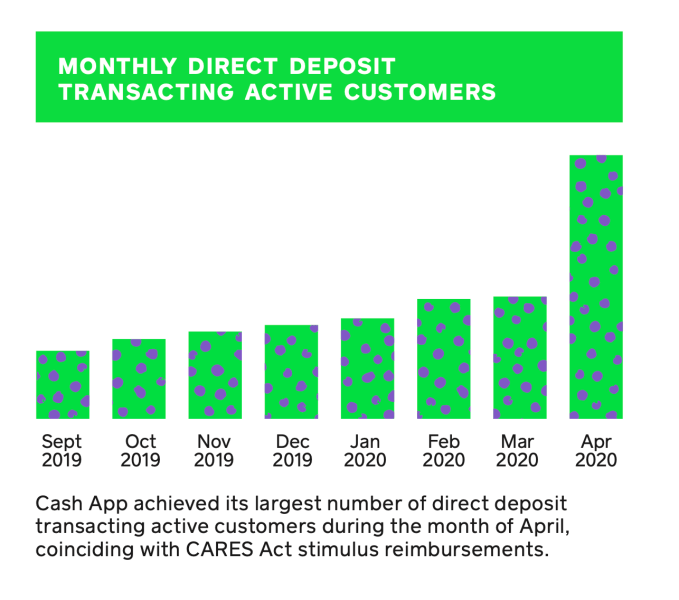
The company moved quickly to accommodate sellers’ need amid the COVID-19 pandemic and quarantine. Within the two weeks of the first shelter-in-place orders in the U.S., Square accelerated Square Online Store product launches to enable contactless commerce, enabling sellers to quickly move their business to an online storefront. Square also added curbside pickup to its in-store pickup functionality and launched a self-managed delivery option.
The shifts to online from in-person selling led to Square Online Store seeing its weekly GPV up more than 5x and the number of sign-ups grow since March. Square Capital added a 24-month loan product as part of Square’s participation in the PPP.
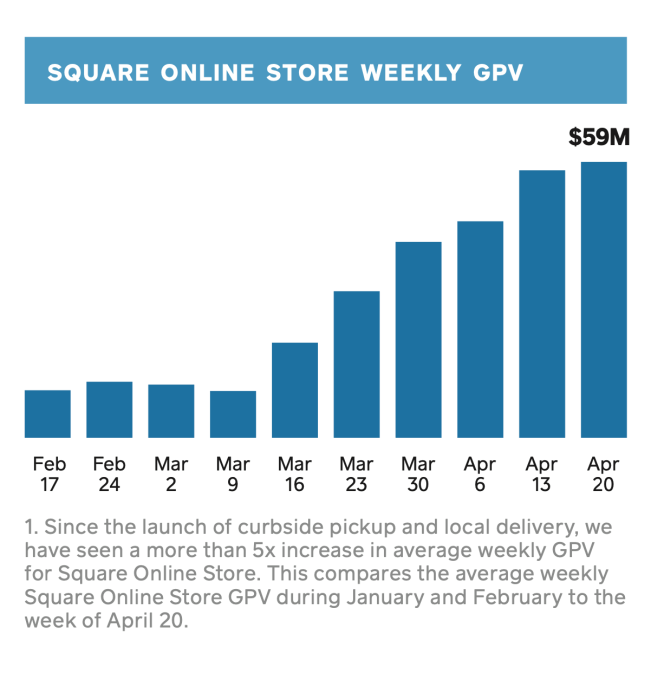
Spotify tests video podcasts
Spotify has shied away from video for years, after having flubbed its launch of original video programming back in 2016. But its interest in podcasts has the streamer now taking a second look at video. According to a report by The Verge this week, Spotify is testing video podcasts in its app, starting with two YouTube stars: Zane Hijazi and Heath Hussar, hosts of “Zane and Heath: Unfiltered.” The global test will appear to 50% of Spotify’s podcast listeners and will likely soon expand beyond that.
This time around, adding support for video makes more sense, as Spotify now owns businesses that are already producing their own videos. For example, it acquired podcast network The Ringer this year, which today uploads its shows like “The Rewatchables” to YouTube.
The test doesn’t necessarily mean Spotify has large video ambitions, however. While The Verge notes Spotify has in progress an LA studio that would facilitate podcasting, including video, the company’s interest is mainly in supporting podcast creators — not building out some sort of broader original video content business.
Spotify CEO says he expects Apple will open up
A big critic of Apple’s anti-competitive behavior, Spotify CEO Daniel Ek said this week he expects Apple will further open its platform after his company filed an antitrust complaint with the EU. The company has spoken out against Apple’s 30% cut of its business, even as it offers a competitor with Apple Music. Spotify has also accused Apple of limiting its app updates and preventing functionality on Apple Watch and Siri.
Quibi fights for rights to mobile video tech in court
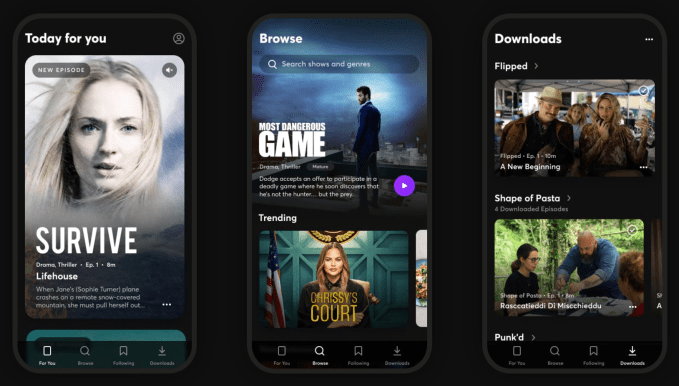
Jeffrey Katzenberg’s newly launched (and already struggling) mobile streaming service Quibi is now battling in court for its rights to use its flagship “Turnstyle” feature, which allows users to seamlessly switch between full-screen video when their phones are turned vertically and horizontally. It’s also Quibi’s standout feature among a middling-to-terrible selection of short-form TV.
New York-based Eko filed suit in March alleging that Quibi’s rotating video tech violates its own patent. Eko claims it demoed its patented tech to Snap, and then two Snap employees moved to Quibi and “invented” the same feature. Quibi’s lawyer argued those employees didn’t have access to the technical details and even questioned whether Eko itself uses the feature described in its complaint. Now that the hearing is complete, both parties await the judge’s decision.
Fortnite adds 100M players in a year, booms amid quarantine
Fortnite has grown to more than 350 million players, its developer Epic Games announced this week. In March 2019, Fortnite had 250 million registered players. But to clarify, these are registered accounts, not monthly actives. But the game maker did give a window into usage, noting that players spent more than 3.2 billion hours in the game in April alone. Its live concert with Travis Scott had 12.3 million concurrent participants. (And who knows how many parents watched with their kids?)
The rise of social gaming is tied to mobile
TechCrunch’s Taylor Hatmaker this week pointed to Fortnite, Minecraft and Animal Crossing’s success at bringing in non-gamers by offering social experiences. Roblox is also clearly on this list, too, any parent can tell you. Fortnite, in particular, capitalized on this trend with its recent introduction of the game mode Party Royale, just for hanging out.
But the other advantage many of these gaming titles have is that they’re not just linked to a console or PC. Players are untethered from their computer screen and TV thanks to cross-platform gaming. While Animal Crossing doesn’t have an iOS/Android mobile app counterpart, the Nintendo Switch itself can either be TV-connected or ported around. This mobile advantage leads to increased opportunities for gameplay.
There are indications of Animal Crossing’s spillover effects on mobile, too — Animal Crossing: Pocket Camp, which doesn’t have ties to New Horizons, just had its best month ever in April, pushing lifetime spending to over $150 million. (One wonders though how many people started playing Pocket Camp because they thought this was the Animal Crossing game everyone’s raving about!)
Apple releases fourth developer betas
Apple this week released the fourth developer betas for more of its platforms, including watchOS 6.2.5, tvOS 13.4.5 and macOS 10.15.5. The company had already released the fourth developer betas of iOS and iPadOS 13.5. These are likely maintenance and bug-fixing releases, given how close we are to the virtual WWDC 2020 event, scheduled for June.
Google unifies its messaging and communications apps into a single team
Hangouts, Meet, Messages, Google Chat, Duo, Google Voice.
Google’s communications app strategy has been a running joke for years as the company rolled out so many competing services. Now, Google may be trying to set things right.
The company last fall scooped up Javier Soltero from Microsoft (which he joined after selling Acompli) to be its VP and GM of G Suite. Soltero has since converted Hangouts Video to Google Meet and Hangouts Chat to Google Chat, in an attempt to clear up the branding mess. As The Verge reported this week, the exec has now been put in charge of Messages, Duo and the phone app on Android, too. That means all of Google’s major communications are under one team at last, which may help it get a handle on what’s otherwise been a very disjointed strategy in previous years.
Google this week also updated its Duo app with a family mode, including masks and doodles.
Google answers your questions about app signing on Google Play
Developers often have questions when enrolling in app signing for the first time, a two-year-old feature that allows Google to manage and protect your app’s signing key for you and uses it to sign your APKs for distribution. It’s a secure way to store your app signing key that helps protect you if your key is ever lost or compromised. App signing by Play also allows you to publish your app with the recommended publishing format, the Android App Bundle.
The company this week published a useful Q&A on Medium to address the many frequent questions developers have regarding the process. The advice is designed to answer the questions the Developer Relations team has heard at conferences, in online forums and in one-to-one conversations.
Uber may use selfie tech to verify mask compliance
Many businesses are now requiring store employees and sometimes even customers to wear masks. But how can a company staffed by remote gig workers manage compliance with its mask-wearing policy? One idea Uber is now considering is leveraging its selfie tech, which has been used to ensure the current driver of the car is the same one that’s been approved to drive for Uber by periodically asking for a selfie. The company believes this same tech could soon be used to ensure the drivers are wearing a mask, Uber said during its earnings call this week.
RIP Wunderlist
Popular to-do list app Wunderlist hung on for years following its acquisition by Microsoft, while Microsoft’s own To Do app was fleshed out. This week, Wunderlist finally died as Microsoft rolled out new To Do features, including overviews of tasks for today, tomorrow or the week ahead, as well as new All and Completed smart lists. Wunderlist creator Christian Reber, meanwhile teased the launch of a new app (Superlist) that will be aimed at project management.
Facebook tests a new connectivity app, Discover
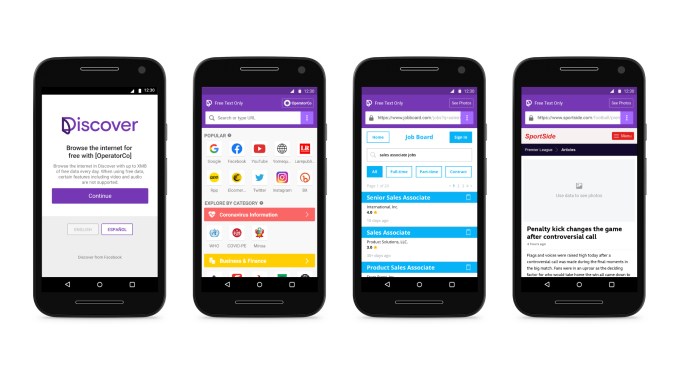
Facebook is testing a new connectivity app called Discover in Peru, which is available on Android and through the mobile web. The app allows users to visit any website in text format and consume a few megabytes of internet data. (10MB for free/day). Other countries may get more and the limit could increase in time. (Anyone watching “Upload” on Amazon Prime Video? See the connection?)
The idea is to see how many people use such an app and whether it could support adding photos in the future. Facebook has several connectivity efforts underway with Internet.org, Express WiFi, Free Basics and others.
Looks like people finally got tired of cooking at home!
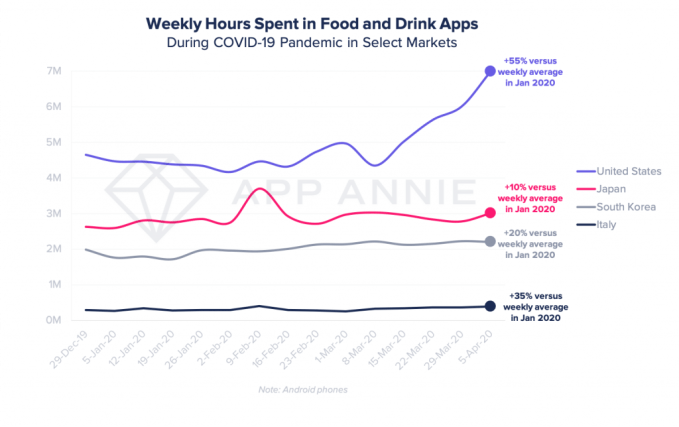
Source: App Annie
Funding and M&A
- Zoom acquired Keybase for its end-to-end encryption expertise. Zoom was the most-download app in April, but the company is still reeling from a number of security issues in the last couple of months as soaring demand for video conferencing exposed its platform’s weaknesses. These included its misstatements about its use of end-to-end encryption, for which it has apologized and said it would fix. (Pressure from state AGs is also pushing Zoom to move quickly.) Former Facebook and Yahoo Security executive Alex Stamos, who has been advising Zoom, said the acquisition will be used to come up with a more highly secure version of Zoom meetings.
- Social network for women, Peanut, raises $12 million Series A amid the pandemic. The app began as a sort of “Tinder for meeting mom friends” but has since evolved into a larger social platform developed by and created for women.
 The app has a heavy focus on pregnancy and children, but is expanding into other areas, including with a new group for women going through menopause soon. In the app, women can join official Peanut groups or create their own. Peanut is also now looking to introduce video chat as in-person meeting is no longer in demand due to the coronavirus. The app has 1.6 million users, up from 1 million in December.
The app has a heavy focus on pregnancy and children, but is expanding into other areas, including with a new group for women going through menopause soon. In the app, women can join official Peanut groups or create their own. Peanut is also now looking to introduce video chat as in-person meeting is no longer in demand due to the coronavirus. The app has 1.6 million users, up from 1 million in December. - Lime raises $170 million. Uber led the round, which included Alphabet, Bain Capital Ventures, GV and others. As part of the deal, Lime will acquire Uber’s subsidiary, Jump. Both apps will remain for now. The coronavirus pandemic has put a damper on consumer demand for bikes and scooters, given that almost everything is closed and the pace of life itself has even slowed for many. Demand for Uber is down too, leading the company to cut costs, including massive layoffs. Lime also recently laid off 13% of its workforce. This may seem like an odd time for Uber to back a scooter company, but it sees the potential of getting in a business it still believes has long-term potential when its valuation is lower. (The Information said the deal values Lime at $510 million, a 79% drop from its previous valuation.)
- Fintech startup N26 extended its Series D round with another $100 million of funding at the same valuation of $3.5 billion for its challenger bank. In total, N26 has raised $570 million as part of its Series D round.
- Debugging software startup Instabug raises $5 million Series A. The round was led by Accel and comes at a time when mobile app usage is surging during the lockdown. The company offers mobile developers tools like real-time insights throughout the app life cycle, including bug and feedback reporting, secure crash reporting and in-app surveys.
- Sensor Tower raises $45 million as demand for app data grows. The company offers app data that helps developers and marketers better understand the app economy as a whole and how it relates to their own app.
- Intel buys urban mobility platform Moovit for $900 million. Moovit provides traffic data to third parties, including Intel, Uber and thousands of transit authorities.
- Modern Games acquires Beasts of Balance. Modern Games is a studio that works to create games that combine physical and digital play. It will now relaunch existing game Beasts of Balance, which involves stacking physical animal pieces and scanning them into a mobile app that keeps score and brings them to life.
Downloads
Read Along by Google
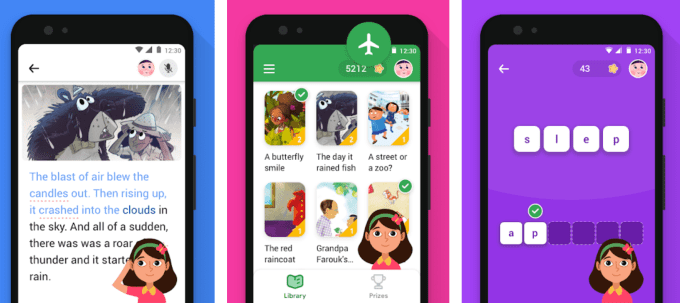
Google this week launched an early childhood education app, Read Along, that uses speech recognition and text-to-speech technology to help kids practice reading. The app includes a digital assistant, Diya, who listens to kids’ read the text then can jump in when they’re struggling with words. The app is based on Google’s Indian version of Read Along, called Bolo. Read Along is available in nine languages, including English. Google says the app handles all its voice processing on the device and doesn’t store voice data or sync it to the cloud, meaning the app can work when the device is offline.
Google Lens
Google Lens got a nifty upgrade this week. Google Lens is Google’s smart object recognition feature, which is available today as both a standalone mobile app as well as a Google Search integration accessible from the Google mobile app. Lens promises a way to visually search using just your phone’s camera, but it’s been slow to roll out improvements.

Lens users can point their camera at any handwritten text, highlight the text on-screen, then copy and paste it into any document, like Google Docs, for example. You can already use this feature to copy paper notes and text to your phone, but now you can choose “Copy to Computer” to paste the text to any other signed-in device with Chrome.
The feature works better with neater handwriting, but could be handy for those who have a lot of pen-and-paper jottings like class notes, Post-it reminders or to-do lists that they need to quickly move to their computer.
To use the feature, you’ll need Google Lens on Android or the Google iOS app and Google Chrome.
The company also adding new look-up and pronunciation features for words, but the latter requires Android for now.
Public
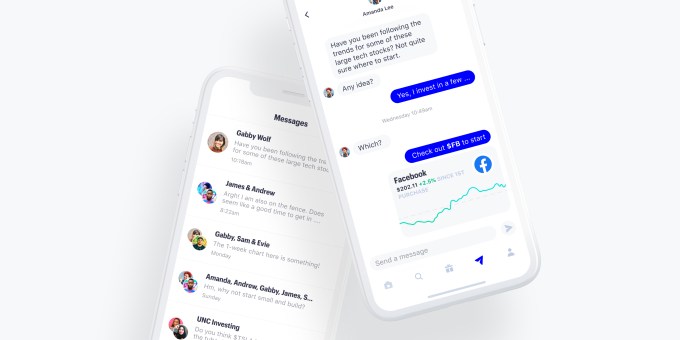
Investing app Public launched last fall and has been growing quickly since, particularly in the past couple of months. In April, Public saw new customer growth over 80%, month-over-moth, a doubling (+100%) of trading activity, and tripling (+200%) of time spent in app. Public competes with similar investing apps like Robinhood, Wealthfront, Betterment and others. Like others, it allows users to buy fractional shares, invest in ETFs and invest in themes for free.
But what makes Public different is its social component, which as of this week includes private and group messaging — something that resonates at a time when people are facing uncertainty about financial markets and may want to discuss investment strategies.
Here Kitty!
The company behind Heads Up! and to-do app Clear came out with an adorable and fun way to keep your kids entertained during quarantine. Its new iOS app “Here Kitty!” is a real-world game you play with your phone. To get started, a player hides the phone somewhere, placing it face down. Then others go look for it by yelling, “here kitty!” The app meows in response… or sometimes hisses! When you find “kitty” the app tells you how long it took. Many apps have tried to combine real-world play and mobile, but none have done it quite so simply and seamlessly.


